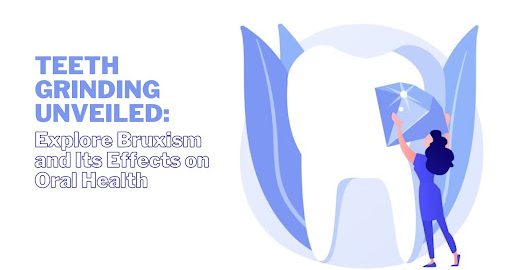
Bruxism: Understanding Teeth Grinding and Its Impact on Oral Health
Some of us at one point in life start grinding teeth, be it during sleep or stress. Much as the situation may seem not worse, it results in damage to your oral health because bruxism is yet a commonly ignored condition of people who have this oral condition. This blog focuses on letting people know as much about the causes, the symptoms of bruxism, and what it actually does to our teeth or even to our oral system.
What is Bruxism?
Bruxism is the clenching and grinding of the teeth, which often occurs during sleep but sometimes during the day as well. Mild or severe, bruxism afflicts children and adults alike. Although nocturnal grinding is not a problem when it occurs occasionally, frequent and relentless force can seriously damage teeth and cause pain.
Causes of Bruxism
The causes of bruxism are not known well, but a wide variety of factors contribute to its development. Here are some of them.
- Stress and Anxiety: Belief in the two things that most trigger the occurrence of grinding of the teeth is that of stress and anxiety. All the accumulated tension in the course of the day can then all overflow at night and hence precipitate clenching as well as grinding at nights.
- Malocclusion: The wrong bite condition of a teething misalignment may force the body to position the jaws into proper rest with bruxism at night.
- Dyssomnias: The disorder of hypersomnia, otherwise called sleep apnea, might be able to force the airway to reopen by frequent grinding by bruxism.
- Lifestyle Habits: Alcoholics, cigarette smokers and indulgers of street drugs usually have high rates of having a bruxism attack on them
Bruxism Symptoms
In order to identify if the victim or patient suffers from the sleeping bruxism. A few general signs tell or indicate a possible cause from bruxism such as:
- Teeth sensitivity or hurt due to wear on protecting enamel.
- Face Pain and Headaches: Jaw tension is built up since it is grinding constantly leading to pains in the face along with headaches.
- Enamel Wears Away: Bruxism wears down the biting surfaces over time to become smooth and dulled.
- Cracks and Breaks: Chewing can even cause a break in your teeth crack and may even shatter it completely
- Sleep Interruption: Bruxism interferes with the grinding individual, but also with the sleep of the sleeping partner.
Ignoring bruxism can have devastating effects on oral health:
Ignoring bruxism can have significant consequences on oral health:
- Dental Damage: Bruxism, if left unattended, can erode the teeth so much that they are prone to cavity and fractures, decay.
- TMJ Disorders: TMJ connects the jaw with the skull. Bruxism exerts undue pressure on the joint, which might result in TMJ disorders and pain.
- Gum Recession: The pressure caused by grinding may lead to gum recession, exposing sensitive roots of teeth.
- Untreated and severe bruxism might result in the destruction or wearing of teeth that eventually could become lost; restoration would demand expensive procedures especially to the patients fitted with dental implants
- Aesthetic Dentistry: When significantly worn out and destroyed, the dentition would interfere with patient appearance with regard to aesthetic smile but these factors affect self-confidence and therefore indirectly the self-esteem of patients.
Preventive and Curative
Bruxism may be nearly impossible to end once the habit is formed. However, there are steps a patient can take toward either preventing or controlling their symptoms:
- Stress Reduction:Engage in stress-reducing practices, such as meditation, yoga, or regular exercise, to reduce grinding from anxiety.
- Nightguard or Mouthguard: Your dentist can create a custom-fit mouthguard to protect your teeth from grinding while you sleep.
- Treatment of Malocclusion:Orthodontic treatment will correct the malocclusion, thereby making the patient’s poor occlusion no longer an adaptive behavior, and the compulsion to grind will decrease considerably.
- Avoid Stimulants: Steer clear of all sources of alcohol, caffeines, and tobacco product, which will reduce bruxism.
- If this situation is interfering with you at work or in routine, and if it critically impacts your oral cavity seek professional help; there seek a dentist or sleeping disorder specialist for further and needed treatment.
Bruxism is that everyday disease condition which would seriously jeopardize the health of our mouths, mainly our oral cavities unless dealt with on time. There’s a very simple aspect involved here to acknowledge what we’re going through as far as this disease condition is concerned-what could have led us to become the victim, and when would be the best time for an effective response in order to protect ourselves.
Leave a Reply
Leave a Reply
Explore More Similar Posts
Explore More Blogs


Leave a Reply